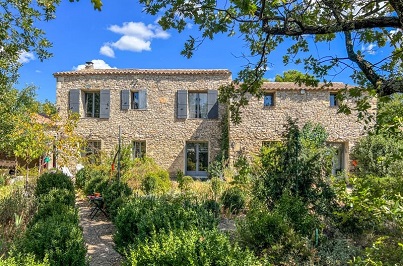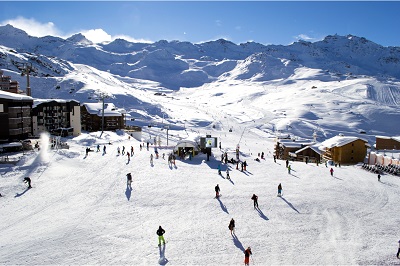
Home > Guide for buying in France
Welcome to Detectimmobilier ! Your Guide for buying property in France

 Buying property in France can be an exciting venture, whether you're looking for a vacation home or planning to relocate permanently. However, it's essential to navigate the French property market with careful consideration and professional guidance. This guide will walk you through the key steps and considerations when purchasing real estate in France.
Buying property in France can be an exciting venture, whether you're looking for a vacation home or planning to relocate permanently. However, it's essential to navigate the French property market with careful consideration and professional guidance. This guide will walk you through the key steps and considerations when purchasing real estate in France.

The ultimate guide for buying property in France
Purchasing a property in France is a dream shared by
many, whether it's the allure of charming countryside
retreats, the cosmopolitan vibe of Parisian apartments,
or the allure of coastal villas bathed in Mediterranean
sun.
However, embarking on this journey requires more
than just a passport and a love for baguettes; it
demands careful planning, thorough research, and expert
guidance.
Welcome to our "12 steps Ultimate Guide for Buying Property in France" your
comprehensive roadmap to navigating the intricate landscape of French
real estate.
In the pages that follow, we will unravel the complexities
of this captivating endeavor, providing you with invaluable insights,
expert advice, and step-by-step instructions to ensure your property
purchase in France is not just a dream but a successful reality.
Whether you are a first-time buyer or a seasoned investor, this guide
is designed to empower you with the knowledge and tools necessary to
make informed decisions at every stage of the property acquisition
process.
From understanding the legal intricacies of the "notaire"
system to exploring the diverse regions and cities, and from negotiating
effectively to managing ongoing expenses, we've got you covered.
To help you, Detectimmobilier created a complete
Glossary of all property terms and vocabulary.
Read more.....
So, whether you envision a
rustic cottage in Provence, a
chic
apartment in Paris, an apartment or chalet at the foot of the ski slopes, a typical house in Brittany, or a
beachfront villa on the French Riviera, let's
embark on this journey together.
The Ultimate Guide for Buying Property
in France is your trusted companion, ensuring that the charming French
property of your dreams becomes a tangible reality.
What are the 12 steps to follow for a successful real estate purchase in France?
1. Define Your Objectives:
- Purpose of Purchase: Determine your primary reason for buying property in France. Is it for a vacation home, investment, retirement, or permanent relocation?
- Budget Planning: Create a detailed budget that encompasses not just the property price but also all associated costs, including taxes, fees, renovations, and ongoing expenses.
2. Research Locations:
- Geographic Preferences: France offers diverse landscapes and climates. Research and narrow down your preferred regions or cities based on your lifestyle and climate preferences.
- Amenities and Infrastructure: Consider the proximity to amenities such as schools, healthcare facilities, public transportation, and shopping centers. Access to these services can greatly affect your quality of life.
3. Legal Framework:
- Notaire System: Understand the role of a notary (notaire) in French property transactions. They play a crucial part in ensuring the legal and financial aspects of the sale are handled correctly.
- Local Legal Expertise: Consult with a local legal expert or notary who is well-versed in French property law. They can guide you through the legal requirements and protect your interests.
4. Financing:
- Financial Planning: Determine how you will finance the property purchase. This may involve securing a French mortgage, using funds from your home country, or a combination of both.
- Mortgage Comparison: Compare mortgage options from different banks in terms of interest rates, loan terms, and eligibility criteria. Choose the one that best fits your needs.
5. Property Search:
- Search Methods: Begin your property search through various channels, such as real estate agencies, online listings, or by hiring a local real estate agent.
- In-Person Visits: Whenever possible, visit the properties in person. This allows you to assess their condition, location, and suitability for your needs.
6. Negotiation and Offer:
- Offer Submission: Work with your agent to submit a formal offer to the seller. Specify any conditions or contingencies, such as inspection results or financing approval.
- Negotiation Skills: Be prepared to negotiate the price, terms, and timeline. Negotiation is a common part of property transactions in France.
7. Due Diligence:
- Property Inspection: Conduct a thorough inspection of the property to identify any issues or needed repairs. Hire a qualified inspector if necessary.
- Document Review: Carefully review property documents and title deeds to ensure clear ownership and any potential legal encumbrances.
8. Signing the Sales Agreement:
- Preliminary Agreement: After your offer is accepted, you'll typically sign a preliminary sales agreement (compromis de vente) and pay a deposit. This agreement may include a withdrawal period.
9. Financing and Finalizing the Sale:
- Securing Financing: Ensure that your financing is in place and coordinate with your bank and notary to finalize the sale.
- Payment: Pay the remaining balance, as well as taxes and fees associated with the purchase.
10. Transfer of Ownership:
- Final Deed Signing: Sign the final deed of sale (acte de vente) in the presence of a notary. This is when the ownership of the property officially transfers to you.
- Keys and Possession: Receive the keys to the property and complete the transfer process.
11. Post-Purchase Considerations:
- Utility Setup: Notify utility providers and set up accounts in your name for services like water, electricity, and gas.
- Property Management: Consider whether you'll need property management or maintenance services, especially if the property will be a second home.
12. Taxes and Ongoing Costs:
- Tax Obligations: Understand your tax obligations in France, including property taxes, income tax, and wealth tax.
- Budgeting: Create a budget for ongoing expenses, including maintenance, utilities, property insurance, and any association fees if you're buying a property in a complex or community.
By following these detailed steps, you can navigate the process of buying property in France with confidence and make informed decisions at each stage of the journey.
Areas covered in France
Welcome to Real Estate Search and Property
Finder - your ultimate destination for finding
the perfect property in your preferred location.
Our team of dedicated Housing Scouts is here to assist you in your quest for the ideal home.
At Detectimmobilier, our real estate hunters speak English because, to honor your project, we must communicate effectively.
Buying Home in France for an Expat or Non-Resident: From Dream to Reality
| Buy alone (1) | Buy with Detectimmobilier (2) | |
| Average time to the sales agreement | 5,4 months | 2-3 months |
| Time spent by the expatriate or non-resident purchaser | 160 hours | 14 hours |
| Number of visits | 6 -7 | 3-4 |
| Matching rate / Purchase criteria | 40% | 99% |
| Purchase price / Initial Budget | +2% | -3% |
| Customer satisfaction rate | 25 - 30% | 96% |
Sources :
(1) Study by Crédit Foncier de France in 2018
(2) Statistics on Detectimmobilier over the last 10 years
Contact Us by mail: recherche@detectimmobilier.com or tel: (+33) 6 73 86 52 60
Feel free to contact us 7/7 for all your real estate inquiries in France
Ready to embark on your real estate journey?
Contact
us today to get started.
Our team of Estate
Hunters is eager to assist you in finding your
dream property in France.
Contact Information
- Phone: +33-6 73 86 52 60
- Email: recherche@detectimmobilier.com
- Address: 5, Route de Combret 12370 Belmont sur Rance - France
Don't miss out on the opportunity to find your dream property. Join us at Real state Search and Property Finder today!
Frequently asked questions
Is this a good time to invest in a property in France?
Investing in property in France can be a good opportunity for expats or non-residents. However, whether it's a good time to invest depends on various factors, including the current real estate market conditions, your financial situation, and your long-term goals.
Here are some things to consider:
-
Market Conditions: Research the current real estate market in France. Look at trends in property prices, demand in the region you're interested in, and any recent changes in regulations or taxes that might affect non-resident investors.
-
Location: France is a diverse country with regional variations in property markets. Consider where you want to invest, as some areas may offer better returns or growth potential than others.
-
Budget: Ensure that you have a clear budget and financing plan in place. This should include not only the property's purchase price but also additional costs such as taxes, notary fees, and ongoing maintenance.
-
Legal Requirements: As a non-resident, there may be specific legal requirements for property ownership in France. You might want to consult with a local attorney or expert to understand the legal aspects.
-
Currency Exchange: Be aware of currency exchange rates, as they can affect your investment's actual cost and return.
-
Long-Term vs. Short-Term: Consider whether you are looking for a long-term investment or a property to use as a second home or vacation rental. Your strategy should align with your investment goals.
-
Taxation: Research the tax implications for non-resident property owners in France, as tax rules can vary.
-
Local Real Estate Professionals: It's advisable to work with local real estate agents and professionals who have expertise in the French market. They can provide valuable insights and assistance.
-
Economic Stability: Evaluate the economic stability and political climate of the country, as these factors can impact the real estate market.
Timing the market perfectly is challenging, but by conducting thorough research and considering these factors, you can make an informed decision about when and where to invest in French property. It's also recommended to consult with financial advisors or experts who specialize in international real estate investments to get personalized advice based on your specific situation.
What is a real estate hunter in France?
A real estate hunter or property finder in France, often known as a "chasseur immobilier," is a professional who assists individuals or businesses in locating and acquiring real estate properties. They act as intermediaries between buyers and the real estate market, providing specialized services to help clients find the right properties.
These professionals offer several services, including:
-
Property Search: Real estate hunters search for properties that match their clients' criteria, whether it's residential, commercial, or investment properties. They often have access to exclusive listings and can save clients time and effort in the property search process.
-
Property Evaluation: They assess the properties they find to ensure they meet the client's requirements and budget. This includes examining the condition, location, and market value of the property.
-
Negotiation: Real estate hunters negotiate on behalf of their clients to secure the best possible terms and prices for the chosen property. They use their knowledge of the local real estate market to help clients get the most favorable deals.
-
Legal and Administrative Assistance: They can help clients navigate the legal and administrative aspects of property transactions, including dealing with contracts, paperwork, and any necessary permits.
-
Property Visits: Real estate hunters arrange property viewings and visits, saving clients time and effort by pre-screening properties to ensure they meet the client's requirements.
-
Investment Advice: For clients looking to make real estate investments, property finders can provide insights and recommendations on potential opportunities.
-
Market Insights: They keep clients informed about the current state of the real estate market, trends, and developments that might impact their property decisions.
These professionals work on a fee-based model, typically earning a commission or a fixed fee for their services, which is often contingent on the successful acquisition of a property. Real estate hunters can be a valuable resource for those seeking properties in France, especially for those who may not be familiar with the local market or want to streamline the property search and acquisition process.
Why should I hire a real estate hunter to buy a home in France?
Hiring a real estate hunter when buying a home in France can be a valuable investment for several reasons, especially if you prefer a professional and efficient approach:
-
Local Expertise: Real estate hunters have in-depth knowledge of the French real estate market, including specific regions and neighborhoods. They can provide valuable insights to help you find the right property.
-
Time Savings: Searching for a property in a foreign country can be time-consuming and challenging. A real estate hunter can save you time by identifying suitable options and arranging viewings.
-
Access to Off-Market Listings: These professionals often have access to exclusive off-market listings that may not be publicly available, giving you a competitive advantage.
-
Negotiation Skills: Real estate hunters are skilled negotiators and can help you secure a property at the best possible price, potentially saving you money in the long run.
-
Legal and Administrative Assistance: They can guide you through the complex legal and administrative processes of buying property in France, ensuring a smooth transaction.
-
Language and Cultural Barrier: If you are not fluent in French or unfamiliar with the local customs, a real estate hunter can bridge the language and cultural gap, making the process less daunting.
-
Tailored Search: These professionals work to understand your specific requirements and preferences, ensuring that the properties they present align with your needs.
-
Investment Advice: If you're considering the property as an investment, a real estate hunter can provide insights into the potential for rental income and appreciation in value.
-
Stress Reduction: Buying a home can be stressful, especially in a foreign country. A real estate hunter can ease your stress by handling many aspects of the process.
-
Post-Purchase Support: Some real estate hunters offer post-purchase services, such as property management or renovation assistance, which can be beneficial for international buyers.
Ultimately, the decision to hire a real estate hunter in France depends on your specific needs and preferences. They can be particularly valuable if you value a professional, efficient, and tailored approach to finding your dream home
How to choose a good Home hunter in France?
To choose a good home hunter and property finder in France, you should consider the following steps:
-
Research and Recommendations: Start by researching property finders and home hunters in France. You can ask for recommendations from friends or colleagues who have used such services. Additionally, look for online reviews and testimonials.
-
Check Credentials and Licensing: Ensure that the home hunter or property finder is licensed and registered, if required in your area. This provides some level of professional assurance.
-
Experience and Expertise: Look for professionals with a good track record and extensive experience in the French real estate market. Experienced individuals are likely to have a better understanding of the market trends, legalities, and negotiation strategies.
-
Services Offered: Understand the services offered by the property finder. Some may specialize in specific areas or types of properties. Make sure their services align with your requirements.
-
Transparent Pricing: Inquire about their fees and pricing structure. Ensure that it is transparent, and there are no hidden costs. Compare the pricing with other property finders in the region.
-
Communication and Language Skills: Effective communication is crucial. Ensure that the property finder can communicate with you in your preferred language. This is especially important if you're not fluent in French.
-
Local Knowledge: A good property finder should have extensive local knowledge. They should be familiar with the neighborhoods, schools, transportation, and amenities in the area where you are looking to buy a property.
-
Client References: Request references from past clients. Contact them to learn about their experiences and whether the property finder met their expectations.
-
Legal and Contractual Expertise: Property transactions in France can be complex. Ensure that your property finder has a good understanding of French property laws, contracts, and can help you navigate these legal aspects.
-
Personal Compatibility: Meet with the property finder in person or via video call to gauge whether you are comfortable working with them. Personal compatibility can be crucial in a successful property search.
-
Written Agreement: Once you decide to work with a property finder, make sure to have a written agreement that outlines the scope of their services, fees, and any other terms and conditions.
-
Regular Updates: During the property search, expect regular updates on potential properties. Effective communication and timely responses are essential.
By following these steps and conducting thorough research, you can increase your chances of finding a good home hunter and property finder in France who can assist you in your property search.
What are the steps in the process of searching for a property in France with an apartment hunter?
When searching for a property in France with an apartment hunter, there are several steps involved. Here's a general outline of the process:
-
Initial Consultation: You will have an initial meeting or consultation with the apartment hunter to discuss your specific requirements, budget, and preferences. This helps them understand your needs.
-
Property Selection: Based on your criteria, the apartment hunter will create a shortlist of properties that match your requirements. They may have access to exclusive listings not available to the public.
-
Property Visits: You'll visit the selected properties with your apartment hunter. They can arrange these visits and accompany you to provide insights and answer your questions.
-
Due Diligence: The apartment hunter will help you perform due diligence on the properties of interest. This includes checking the property's legal status, potential renovations needed, and the neighborhood's amenities.
-
Negotiation: When you find a property you like, the apartment hunter will assist in negotiating the price and terms on your behalf. They can use their market knowledge to get you the best deal.
-
Legal Assistance: They may recommend legal professionals or notaries to ensure a smooth and secure property transaction. This is especially important in France due to the complex legal process.
-
Documentation: Your apartment hunter will help you gather and complete all the necessary documentation required for purchasing the property, including the "compromis de vente" (preliminary sales agreement) and the "acte de vente" (final sales contract).
-
Financing: If you require financing, the apartment hunter can assist in finding suitable mortgage providers and help with the mortgage application process.
-
Closing the Deal: Once all the terms are agreed upon, the apartment hunter will help you close the deal. This includes transferring the funds, signing the final contract, and getting the keys to your new property.
-
After-Sale Services: Some apartment hunters provide post-sale services, such as recommending local contractors, interior designers, or property management companies.
-
Final Handover: You'll receive the keys to your new property, and the apartment hunter may assist with the final walkthrough to ensure everything is in order.
Keep in mind that working with an apartment hunter in France can make the process more efficient and less stressful, particularly for international buyers who may not be familiar with the local market and regulations.
What are the fees for a real estate hunter in France?
The fees for a real estate hunter in France vary depending on several factors, including the region, the complexity of the search, and the services provided. Generally, real estate hunters charge fees that are typically expressed as a percentage of the purchase price of the property being sought. In France, real estate agency fees are typically shared between the buyer and the seller. The percentage charged by the real estate hunter Detectimmobilier falls within the range of 1% to 3% of the purchase price of the property. However, this can vary depending on the region and the demand for this service. It's essential to discuss the fees and terms with the real estate hunter before starting the search. Make sure you have a clear understanding of the services included in these fees, as they may differ from one professional to another.
Can I hire a real estate hunter to search for a property in another city or region?
Yes, it is entirely possible to
hire a real estate hunter to search for a property in another city or
region. The Detectimmobilier network of real estate hunters offers its
services in different locations and is perfectly capable of conducting
remote searches.
It is important to choose a real estate hunter who is
familiar with the specific geographical area where the buyer wants to
find a property.
How can I verify if a real estate hunter is legally registered?
To verify if a real estate hunter is legally
registered, you can ask to see their professional card certificate,
which is issued by the Chamber of Commerce and Industry. This card
proves that the real estate hunter is legally registered as a
professional in the real estate industry and has the necessary skills to
practice this activity.
You can also check the references and legal
information of the real estate hunter and ensure that they are
affiliated with a recognized professional association.
What are the important criteria to consider when searching for a property?
When searching for a property, several important criteria should be considered to ensure that the property meets your needs and preferences. Here are some key factors to keep in mind:
-
Location: The location of the property is crucial. Consider factors like proximity to work, schools, public transportation, shopping centers, and other amenities. Also, think about the neighborhood's safety and overall appeal.
-
Budget: Determine your budget for buying or renting a property. This should include not only the purchase or rent price but also ongoing costs like property taxes, utilities, and maintenance.
-
Type of Property: Decide whether you're looking for a house, apartment, condo, townhouse, or another type of property. Each has its advantages and disadvantages.
-
Size and Layout: Consider the size of the property and its layout. How many bedrooms and bathrooms do you need? Do you want an open floor plan or specific room configurations?
-
Condition and Age: Examine the property's condition and age. Newer properties might require less maintenance, but older ones may have more character.
-
Amenities: Check if the property offers any amenities such as a pool, gym, parking, or a backyard. These can add to your quality of life but may also increase costs.
-
Resale Value: Think about the potential resale value of the property. A property in a desirable location with good growth potential can be a wise investment.
-
Schools: If you have children or plan to in the future, research the quality of nearby schools.
-
Transportation: Assess the accessibility to public transportation and major roads, especially if you commute regularly.
-
Future Developments: Investigate any planned developments in the area. These can affect property values and your quality of life.
-
Safety: Research the crime rate in the neighborhood to ensure you'll be living in a safe environment.
-
Local Services: Consider the availability of local services like healthcare facilities, grocery stores, and entertainment options.
-
Noise Levels: Pay attention to noise levels in the area, both during the day and at night.
-
Home Inspection: If you're buying, invest in a thorough home inspection to identify any hidden issues that might not be immediately apparent.
-
Regulations and Zoning: Be aware of any local regulations and zoning laws that might affect how you can use the property.
-
Community and Lifestyle: Consider the type of community and lifestyle the neighborhood offers. Different areas can have different vibes and cultural atmospheres.
Remember that your priorities may vary depending on your individual circumstances and preferences, so it's essential to make a list of your own priorities and consult with a real estate professional to help you find a property that aligns with your needs.
How can I determine if a property in France is a good investment?
To determine if a property in France is a good investment, you should consider several factors. Here are some steps you can follow:
-
Location: The location of the property is crucial. Research the area to understand its growth potential, proximity to amenities, and the demand for rental or resale properties in that location.
-
Market Trends: Study the current real estate market trends in France. Look for information on property prices, rental yields, and the overall state of the market in the specific region you're interested in.
-
Property Condition: Inspect the property's condition. If it requires extensive renovations or repairs, factor in the costs and how they may affect your investment.
-
Rental Yields: If you plan to rent the property, calculate the potential rental income and compare it to the property's price. You want a good rental yield to make it a profitable investment.
-
Legal Considerations: Understand the legal aspects of buying property in France, including taxes, regulations, and any restrictions that may apply to foreigners.
-
Property History: Check the property's history, including any previous sales, price changes, and reasons for selling. This can give you insights into its value.
-
Return on Investment (ROI): Calculate the potential ROI, factoring in property appreciation, rental income, and expenses. Ensure the ROI aligns with your investment goals.
-
Local Economy: Research the local economy and employment opportunities in the area. A strong local economy often correlates with a good real estate market.
-
Future Development Plans: Investigate any upcoming infrastructure projects or developments in the area, as they can influence property values.
-
Real Estate Professionals: Consider consulting with local real estate agents, property managers, or experts who can provide insights into the market and specific properties.
-
Financing Options: Explore financing options and interest rates in France. This can significantly impact your overall investment.
-
Risk Tolerance: Assess your risk tolerance and investment horizon. Real estate investments can be long-term, and it's essential to be comfortable with the investment timeline.
-
Exit Strategy: Have a clear exit strategy in mind. Know when you might sell the property and under what conditions.
Remember that what makes a property a "good investment" can vary from person to person, depending on their goals and risk tolerance. It's often a combination of factors that makes a property a solid investment opportunity. Consulting with professionals and doing thorough research is key to making an informed decision.
How to get a French mortgage?
Obtaining a French mortgage as an expat or non-resident can be a manageable process if you follow the necessary steps. Here's the Detectimmobilier's guide on how to get a French mortgage:
-
Prepare Financial Documents:
- Gather essential financial documents such as bank statements, proof of income, tax returns, and credit history. These documents will be crucial for your mortgage application.
-
Choose a Lender:
- Research and select a reputable French bank or
financial institution that offers mortgages to
non-residents. Popular options include BNP Paribas,
Crédit Agricole, and Société Générale.
Read more......
- Research and select a reputable French bank or
financial institution that offers mortgages to
non-residents. Popular options include BNP Paribas,
Crédit Agricole, and Société Générale.
-
Understand the Loan-to-Value (LTV) Ratio:
- In France, the maximum LTV ratio typically ranges from 70% to 85%, depending on the lender and the location of the property. This ratio represents the percentage of the property's value that the bank is willing to finance.
-
Down Payment:
- Prepare a down payment, as most French banks require a substantial down payment, usually around 15% to 30% of the property's purchase price.
-
Mortgage Application:
- Complete the mortgage application provided by your chosen lender. This will include your personal information, financial details, and the property's details.
-
Property Valuation:
- The lender will assess the property's value to determine the loan amount. This involves a property valuation carried out by a licensed appraiser.
-
Credit Check:
- The lender will conduct a credit check to assess your creditworthiness. A good credit history is important for mortgage approval.
-
Offer Letter:
- If your application is approved, you will receive an offer letter detailing the terms and conditions of the mortgage, including the interest rate, repayment schedule, and any associated fees.
-
Notary Services:
- You will need to hire a notary in France to
assist with the legal aspects of the property
purchase, including the mortgage contract.
Read more.....
- You will need to hire a notary in France to
assist with the legal aspects of the property
purchase, including the mortgage contract.
-
Insurance:
- In France, mortgage lenders often require
borrowers to have life insurance to cover the
outstanding balance in case of unexpected events.
You may need to arrange this insurance.
Read more.....
- In France, mortgage lenders often require
borrowers to have life insurance to cover the
outstanding balance in case of unexpected events.
You may need to arrange this insurance.
-
Legal and Tax Advice:
- It's advisable to consult with legal and tax advisors who specialize in French real estate transactions to ensure that you understand all the legal and tax implications.
-
Finalize the Mortgage Agreement:
- Sign the mortgage agreement at the notary's office. Be prepared to pay closing costs and any required fees at this stage.
-
Repayment and Monitoring:
- Start making regular mortgage payments as per the terms of your agreement. Many French mortgages are structured as interest-only loans with a balloon payment at the end. Ensure you understand your repayment structure.
Getting a French mortgage as an expat or non-resident may involve some additional complexities, such as language barriers and understanding French mortgage regulations. Working with a knowledgeable real estate agent or mortgage broker who is experienced in dealing with non-resident buyers can be helpful in navigating this process.
What is the difference between a real estate hunter and a real estate agent in France?
The main difference between a real estate hunter and a real estate agent in France lies in their roles and mandates. A real estate hunter works on behalf of the buyer and is tasked with finding a property that meets their specific criteria. On the other hand, a real estate agent typically works on behalf of the seller and is responsible for listing their clients' properties for sale. The real estate hunter therefore acts in the buyer's interest, while the real estate agent acts in the seller's interest.
Discover our departments and cities
Find the perfect Home in France in under 2 months!
More than 15,000 buyers assisted since 2009, making us experts in real estate property search.








